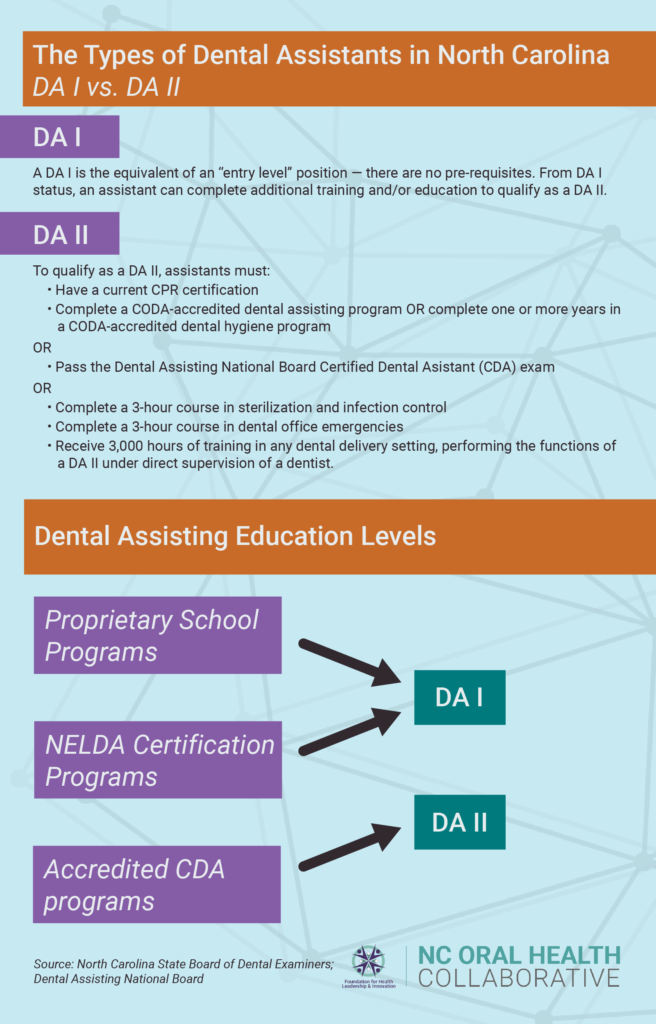
Dental offices are team operations. Take away your dentist or hygienist and the work will grind to a halt. The same goes for dental assistants. They are vital — but often underappreciated — members of the dental team. To learn more about what dental assistants are and the roles they fill, we sat down for a conversation with dental assistant and educator Kati Garrett.
Garrett has worked as a dental assistant, a job she pursued because of her passion for improving oral health, for more than a decade. On top of her day job, Garrett also oversees Catawba Valley Community College’s (CVCC) dental assisting program.
“It’s nice to see the difference you can make working in dentistry. I saw growing up how much dental health can affect you as an individual,” she said. “Both of my parents had dentures, my grandparents had dentures. It wasn’t something stressed for me growing up. But the older I got I realized just how important it is.”
What is a Dental Assistant?
Dental assistants are important members of any dental team, primarily tasked with helping dentists and hygienists perform their jobs efficiently. Assistants fill a variety of roles, however, ranging from directly assisting dentists and hygienists chairside to sterilizing equipment, performing infection control duties, helping patients navigate insurance and billing, working as office managers, and more.
“The role a dental assistant fills can vary—they play a lot of different parts in the dental office,” said Garrett. “When you are trained as a dental assistant you are trained to sit chairside and directly help a dentist or hygienist get their job done quicker and more efficiently. But dental assistants also work as office managers, sterilization technicians, treatment plan coordinators, insurance gurus, you name it.”
One thing that Garrett loves about dental assisting is the opportunities that exist for growth and movement. With all the different jobs that assistants can do in a dental office, there is something for everyone. That versatility — from finances and insurance to everyday logistics — also means that assistants play an important role in keeping an office functioning like a well-oiled machine.
“I think I could probably speak for every dental assistant when I say this. If you keep your dental assistants happy, you can get a lot of work done,” said Garrett. “Dental assistants are so much a part of keeping things rolling in the dental office that if you treat them well and make sure their hard work is appreciated, they can really keep the dental office moving.”
How Do You Become a Dental Assistant?
There are several paths to becoming a dental assistant, and a variety of programs train dental assistants at various levels.
“There are accredited schools – you come out of those as a Certified Dental Assistant,” said Garrett. “There are also a ton of proprietary schools that offer 8-week or 12-week courses, but the education can also be as simple as receiving all of your training chairside. You’ll have to get certifications of course, but as far as learning the skills of a dental assistant, that can be done in the dental office, taught by your dentist.”
The program that Garrett oversees at CVCC offers a new path to becoming a dental assistant, in between the shorter 8-12-week courses from proprietary schools and the longer accredited programs. Students who complete CVCC’s 6-month dental assisting program can apply to take the National Entry Level Dental Assisting (NELDA) certification, a new certification from the Dental Assisting National Board (DANB).
NCOHC’s associate director, Crystal Adams, launched the NELDA certification program when she worked for CVCC. She said that her hope is for the program to offer an expedited path to dental assisting that includes a more comprehensive and accountable baseline education compared to other, faster programs.
In North Carolina, dental assistants are classified as “DA I” or “DA II” depending on their education and training. A DA II can take the DANB examination to become a Certified Dental Assistant. In some states, dental assistants are registered with Dental Boards for consumers and providers to confirm their credentials; however, North Carolina does not. Dental assistant education and training requirements can be found on the North Carolina State Board of Dental Examiners website.

While there are numerous routes to becoming a dental assistant, graduating from a Commission on Dental Accreditation (CODA) Dental Assistant Program allows a dental assistant the most comprehensive education and training for the dental field. These programs are offered at North Carolina Community Colleges throughout the state and a list of programs can be found on DANB’s website.
What Else Should I Know About Dental Assisting?
“I think that we should probably hold proprietary schools more accountable,” said Garrett.
Garrett said that more attention should be paid toward the institutions training assistants, ensuring that they are providing quality education.
“If you work for a great dentist, you are shown appreciation and know that your job is important,” said Garrett. “That has certainly been the case for me, but sometimes dental assistants are forgotten.”
Overall, Garrett thinks that dental assisting is a great profession with lots of opportunities. She also said, however, that they are sometimes underappreciated and underpaid.
“When I came in as an assistant 10 years ago, I was making $11.50 an hour,” she said. “Man have I grown since then, but there are plenty of dental offices out there where that pay range is still the case.”
NCOHC, a program of the Foundation for Health Leadership & Innovation, works to advance systems-level changes, improving the overall health and well-being of all North Carolinians by increasing access and equity in care. To stay up-to-date and get involved, join us today as a North Carolinian for Change.


